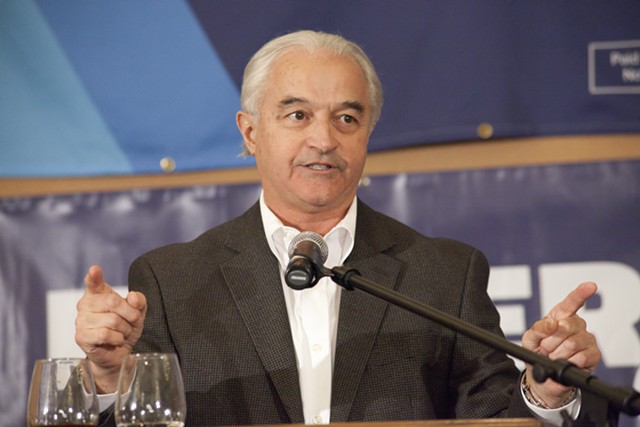click to enlarge 
- File: Matthew Thorsen
- Attorney General Bill Sorrell
Updated at 11:47 p.m.
Bill Sorrell, the longest serving attorney general in the history of Vermont, said Monday he will not seek reelection next year.
"It has been my honor and pleasure to serve the people of Vermont as Attorney General for well over eighteen years," he said in a written statement. "I announce today that I will not be a candidate for reelection in 2016."
Sorrell, who faced a formidable electoral opponent and an independent investigation into his fundraising practices, said he would serve out the remaining 15 months of his term. During that time, he pledged, he would continue working on “the many important issues we confront.” The 68-year-old Burlington Democrat did not say what he planned to do next.
For a man who has spent much of his adult life in public service, Sorrell made his announcement in a remarkably low-key fashion. Rather than hold a press conference, he delivered the news in a terse, five-sentence statement emailed to reporters Monday afternoon.
"I am proud of my office and its many accomplishments," he wrote. "I am deeply grateful for the support I have received and continue to receive from so many Vermonters."
A son of the late state senator Esther Sorrell, Bill Sorrell served two stints as Chittenden County state’s attorney before becoming governor Howard Dean’s secretary of administration in 1992.
“This is a guy who had a very sharp mind, great attention to detail and understood government,” Dean said this week, crediting Esther Sorrell and her sister, Peggy Hartigan, with fostering his own political career.
Dean appointed Sorrell attorney general in 1997, after which Sorrell faced little electoral competition for the next decade and a half.
But in recent years, the AG's star has dimmed.
In 2012, Chittenden County State’s Attorney T.J. Donovan nearly defeated him in the Democratic primary. Despite his long tenure, Sorrell struggled to lock up support from prominent Democrats and members of Vermont’s legal community, forcing him to raise money from out-of-state lawyers. Many credited his nail-biter of a victory to the $200,000 worth advertisements bought at the last minute by a super PAC affiliated with the Democratic Attorneys General Association.
Last March,
Seven Days published several stories chronicling Sorrell’s
lack of compliance with state campaign finance laws, his
participation in corporate-funded retreats and
his close connection to lobbyists affiliated with DAGA.
Documents showed that Sorrell accepted $10,000 in campaign contributions from those associated with a Texas law firm a week after its lobbyists asked him in a New Orleans meeting to sue the oil and gas industry. Within months, Sorrell agreed to sue and hired the Texas firm — as well as its lobbyists — to represent the state, guaranteeing them a share of any winnings.
Seven Days’ stories built on
a Pulitzer Prize-winning series by the
New York Times’ Eric Lipton, who examined the influence national corporations and law firms have over state attorneys general.
In April, Charlotte attorney and Vermont Republican Party vice chairman Brady Toensing
filed a complaint against Sorrell and called on him to appoint an independent prosecutor to investigate himself.
A Senate committee followed suit, prompting Gov. Peter Shumlin and a committee of state’s attorneys
to appoint former state representative Tom Little to investigate the matter.
Sorrell has repeatedly said he did nothing wrong.
Little’s investigation is expected to be completed later this year. David Cahill, executive director of the Department of State’s Attorneys and Sheriffs, said Monday that Sorrell’s announcement would not put an end to the inquiry.
“The investigation conducted by Mr. Little on behalf of a bipartisan committee of the State's Attorneys is a deliberative, truth-finding process that will not, and should not, be affected by today's political headlines,” Cahill said in a written statement. “We are committed to the thorough and impartial administration of justice.”
In June, Donovan announced he would challenge Sorrell again in 2016. At the time,
Sorrell told multiple media outlets that he would await the conclusion of Little’s investigation before deciding whether to run for a tenth full term.
"I will not seriously think about [the 2016 election] before Tom Little has completed his look into Brady Toensing's various allegations,” he told
Seven Days’ Terri Hallenbeck. “I look forward to the truth coming out."
But on Monday, Sorrell claimed he had long ago decided to retire next year.
“I had plans to have this be my last term for pretty close to five years now actually,”
he told Vermont Public Radio’s Peter Hirschfeld.
Sorrell did not respond to
Seven Days’ requests for an interview. According to Dean, “it was pretty clear” his old friend was planning to retire.
“We talked about a year or so ago — he brought it up — and his thinking was, ‘What’s next? What am I going to do next? I think I’ve been doing this long enough,’” Dean recalled.
Speaking after Sorrell’s announcement, Donovan said he respected his onetime opponent’s decades of public service.
“I’ve had my differences with Bill. That’s no secret. But I think today is a day to say thank you to Bill Sorrell for his long and dedicated service to the state,” Donovan said. “I wish him the best in his future endeavors.”
In a written statement, Shumlin praised Sorrell for “protecting consumers and ensuring justice is served.”
The governor continued, “From taking on big tobacco to protecting Vermont’s environment and health to fighting to ensure Vermonters have the right to know what is in their food, Bill Sorrell has consistently fought to protect Vermonters and make this state a better place.”
Not everyone was as charitable.
In his own statement, Toensing wrote that Sorrell had "cynically and hypocritically enforced the law” for years.
“His party has abandoned him. He is professionally lethargic. Yet, he is facing a young, vibrant and committed opponent,” Toensing said, referring to Donovan. “And his super PAC friends would be politically precluded from trying to save him again with another illegal contribution. Even General Sorrell was able to see the writing on the wall.”
Dean said he saw it differently.
“The system sucks, but I don’t think you can blame Sorrell for doing things that everybody else is doing,” the former governor said.




















































